Nissan SR engine
The Nissan SR engine is a 1.6 L (1,596 cc), 1.8 L (1,838 cc) or 2.0 L (1,998 cc) straight-four, four-stroke gasoline internal combustion engine manufactured by Nissan Motors. It has an aluminum head and block with steel sleeves and has a DOHC 4-valve design, with variable valve timing on select models. The engine was used in many small to medium Nissan vehicles including high-performance turbocharged variants. It was designed by Nissan as a replacement for the earlier CA series of engines. Power output shown is JIS Net PS or ECE Net kilowatts unless otherwise indicated.
| Nissan SR engine | |
|---|---|
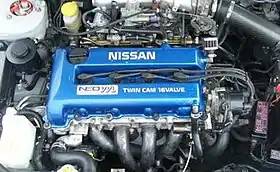 Nissan SR16VE engine | |
| Overview | |
| Manufacturer | Nissan (Nissan Techno) |
| Production | 1989–2002 |
| Layout | |
| Configuration | Inline-four engine |
| Displacement | 1.6 L (1,596 cc) 1.8 L (1,838 cc) 2.0 L (1,998 cc) |
| Cylinder bore | 82.5 mm (3.25 in) 86 mm (3.39 in) |
| Piston stroke | 68.7 mm (2.70 in) 86 mm (3.39 in) |
| Valvetrain | DOHC 4 valves x cyl. with VVT (some versions) |
| Compression ratio | 9.0:1, 9.5:1, 10.3:1, 11.0:1 |
| Combustion | |
| Turbocharger | Garrett T25G or T28 (some versions) |
| Fuel system | Fuel injection |
| Fuel type | Gasoline |
| Cooling system | Water-cooled |
| Output | |
| Power output | From 110 PS (81 kW; 108 hp) to 320 PS (235 kW; 316 hp) |
| Torque output | From 150 N⋅m (111 lb⋅ft) to 418 N⋅m (308 lb⋅ft) |
| Chronology | |
| Predecessor | Nissan CA engine |
| Successor | Nissan QG engine Nissan QR engine Nissan MR engine |
SR16VE
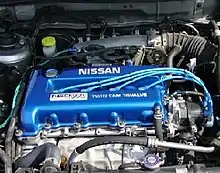
The 1.6 L (1,596 cc) SR16VE has Nissan's Neo VVL variable valve timing with lift control. It produces 175 PS (129 kW; 173 hp) at 7800 rpm and 119 lb⋅ft (161 N⋅m) at 7200 rpm. Redline is at 8300 rpm. Bore and stroke is 86 mm × 68.7 mm (3.39 in × 2.70 in) with a 11.0:1 compression ratio.
It is used in the following vehicles:
- N15 Nissan Pulsar VZ-R
- B14 Nissan Lucino VZ-R
- B15 Nissan Sunny VZ-R
SR16VE N1
This version was used in the limited-production Pulsar VZ-R N1, produced from 1997 to 1998. These cars were tuned by Autech Japan. It made 200 PS (197 hp; 147 kW) at 7800 rpm and 134 lb⋅ft (182 N⋅m) at 7600 rpm. Redline of the N1 Version 2 (1998) is at 8600 rpm. This is also claimed to be the most powerful production 1.6 L naturally aspirated engine.
SR18Di
The SR18Di is a 1.8 L (1,838 cc) DOHC engine. It produces 110 PS (108 hp; 81 kW) at 6500 rpm and 150 N⋅m (111 lb⋅ft) at 4000 rpm. Based on the Single Point Fuel Injection system, it was installed on JDM cars and some UK versions. This model used some cast iron blocks and it was used on the P10 generation Nissan Primera, but due to the low overall power this engine option was dropped on the next generation.
This engine was never used on the USDM counterpart the Infiniti G20
It is used in the following vehicles:
- 1990-1993 Nissan Primera
- Nissan Sunny
- Nissan Bluebird U12
- Nissan Avenir W10
SR18DE
The SR18DE is a 1.8 L (1,838 cc) DOHC engine. It produces 125 PS (123 hp; 92 kW) at 6000 rpm and 156 N⋅m (115 lb⋅ft) at 4800 rpm. This engine came with Multi Point Fuel Injection System ECCS (Electronic Concentrated Control System). The SR18DE crankshaft was produced with four fewer counterweights than the SR20DE variants, which have eight, for lighter weight and better fuel efficiency. These lightweight crankshafts were also homologated for use in the Japanese N2 Silvia racing program and later used in the SR20VE engine.
It was used in the following vehicles;
- 1991-1997 Nissan Primera
- Nissan Sunny
- Nissan Avenir W10
- Nissan Rasheen
- 1991-1997 Nissan Bluebird U13
- 1989-1998 Nissan Bluebird U14 119 PS (117 hp; 88 kW) Factory detuning and refining of fuel injection.
- 1990-1993 Nissan Pulsar GTi B13 and N14, 140 PS (138 hp; 103 kW) at 6400 rpm and 167 N⋅m (123 lb⋅ft) at 4800 rpm
- 1991-1999 Nissan Pulsar GTi N15, 140 PS (138 hp; 103 kW) at 6400 rpm and 167 N⋅m (123 lb⋅ft) at 4800 rpm
- 1989(??)-2001 Nissan Presea 125 PS (123 hp; 92 kW)
SR20Di
The SR20Di is a 2.0 L (1,998 cc) DOHC engine. It produces 116 PS (114 hp; 85 kW). Bore and stroke are 86 mm × 86 mm (3.39 in × 3.39 in). Similar to the 1.8 liter version except for bigger displacement with a throttle body injection system.
It is used in the following vehicles:
- 1991-1994.5 Nissan Primera
- 1992- 1995 Nissan Silvia
SR20DE
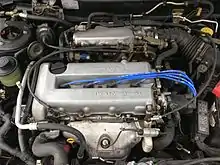
The Nissan SR20DE engine was used in over 15 Nissan models. It first appeared in October 1989, and over time it was gradually phased out with the introduction of the QR (low-emissions) engine family. The SR20DE carried nominal power ratings between 125–165 hp (127–167 PS; 93–123 kW) from the factory. Although there are some Autech models with horsepower ratings of between 175-200hp depending on the chassis and degrees of tuning.
The breakdown of the engine code is as follows:
- SR - Engine
- 20 - 2.0 Litres
- D - Dual Overhead Cams
- E - Electronic Fuel Injection
This engine has the following specifications (SAE, 1991)
| The Specs | |
|---|---|
| Type: | Water cooled, 4 cycle in-line 4 cylinder |
| Combustion Chamber: | Cross flow, pentroof type |
| Valve mechanism: | DOHC, 4 valves per cylinder, chain drive |
| Displacement: | 1,998 cc (2.0 L) |
| Bore x Stroke: | 86 mm × 86 mm (3.39 in × 3.39 in) |
| Bore Pitch: | 97 mm (3.82 in) |
| Block Height: | 211.3 mm (8.32 in) |
| Compression ratio: | 10.0:1 |
| Crankshaft journal diameter: | 55 mm (2.17 in) |
| Crankpin diameter: | 48 mm (1.89 in) |
| Con rod length: | 136.3 mm (5.37 in) |
| Valve diameters: | Intake: 34 mm (1.34 in), Exhaust: 30 mm (1.18 in) |
| Dimensions: | 685 mm (27.0 in) x 610 mm (24 in) x 615 mm (24.2 in) |
| Power: | 145 hp (147 PS; 108 kW) at 6400 rpm (SAE net) |
| Maximum torque: | 132 lb⋅ft (179 N⋅m) at 4800 rpm (SAE net) |
It was used in the following vehicles:
| Model | Years Produced |
|---|---|
| 180SX | 1991–1992, 1994–1998 |
| 200SX SE-R | 1995–1998 |
| Almera | 1996–1999 |
| Almera Tino | 1998–2006 |
| Avenir | 1990, 1992–1995, 1997–2001 |
| Bluebird | 1989, 1991–1993, 1995–1998, 1999–2007 |
| Liberty | 1998–2000 |
| Infiniti G20 | 1991–2002 |
| NX2000 | 1991–1996 |
| Prairie Joy | 1995–1997 |
| Presea | 1990–1993, 1995, 1997–1998 |
| Primera | 1990–2002 |
| Pulsar | 1991–2000 |
| R'nessa | 1997–1998, 2000 |
| Rasheen | 1998 |
| Sentra | 1991–1994, 1998–2001 |
| Serena | 1991–1995, 1997–2000 |
| Silvia | 1991–1993, 1995-1996, 1998–2002 |
| Wingroad | 1996–1999 |
| Tommykaira ZZ (first generation) | 1990–2000 |
SR20DET
P11 2.0
Origins

The SR20DET was first produced in the U12 Nissan Bluebird 2000SSS Attesa in October 1989 . From 1990 through to 1994 it was used in the Nissan Pulsar GTi-R (RNN14) however with a bigger T28 turbo. In both these cars, the engine is aligned in a transverse fashion.
However, the RWD Nissan Silvia produced from 1988 was built with a longitudinally aligned SR20DET.
The engine was used in the Nissan Avenir in 1995, the Nissan R'nessa in 1997, and the Nissan Liberty in 1999.
Out of all the Nissan models produced with the SR20DET, the Silvia was the longest-running model to use it. The S14 and S15 use a bigger turbocharger than the S13 models.
Valve cover colors
The colors of the valve covers seem to be related to the year the engine was released.
| Color | Model | Years |
|---|---|---|
| Red | S13/180SX/Bluebird/Pulsar | 1989–1994 |
| Black | S13/180SX | 1994–1998 |
| Black | S14/S15 | 1994–2002 |
| Silver | Avenir/R'nessa | 1995–2001/1997-2002 |
- S13 Black top – 180sx's post-94 (Garrett T25G turbo)
- S13 Red top – S13 Silvia and 180sx pre-94 (Garrett T25G turbo)
- S14 Black top – 1994-98 (notchtop) Silvias – Variable Cam Timing aka VCT was introduced on the intake cam (Garrett T28 journal bearing turbo for Australian and European markets and Garrett T28 Ball Bearing turbo for the Japanese market)[1]
- S15 Black top – 1999-2002 Silvias. As S14 but with PTU within ignition coil packs, 6-speed manual transmission (Garrett Journal Bearing T28 for Europe and Australia and Ball Bearing T28 turbo for Japan)
It was available in the following vehicles:
- S13/14/15 Nissan Silvia
- S13 Nissan 180SX, 205 PS (202 hp; 151 kW) / 6000 rpm, 274.59 N⋅m (203 lb⋅ft) / 4000 rpm
- S14 + S14a Nissan 200SX, 220 PS (217 hp; 162 kW) / 6000 rpm, 274.59 N⋅m (203 lb⋅ft) / 4800 rpm
- S15 Nissan Silvia (JDM), 250 PS (184 kW; 247 bhp) / 6400 rpm, 275 N⋅m (203 lbf⋅ft) / 4800 rpm
- RNN14 Nissan Pulsar GTi-R, 230 PS (227 hp; 169 kW) / 6400 rpm, 284.39 N⋅m (210 lb⋅ft) / 4800 rpm
- NN30Nissan R'nessa GT Turbo, 200 PS (197 hp; 147 kW) / 6000 rpm, 264.78 N⋅m (195 lb⋅ft) / 4000 rpm
- HNU13 Nissan Bluebird SSS ATTESA Limited, 210 PS (207 hp; 154 kW) / 6000 rpm, 274.59 N⋅m (203 lb⋅ft) / 4000 rpm
- HNU12 Nissan Bluebird SSS ATTESA Limited, 205 PS (202 hp; 151 kW) / 6000 rpm, 274.59 N⋅m (203 lb⋅ft) / 4000 rpm
- PNW11 Nissan Avenir Highway Star/GT4, 230 PS (227 hp; 169 kW) / 6000 rpm, 274.59 N⋅m (203 lb⋅ft) / 3600 rpm
- PNM12 Nissan Liberty GT4, 230 PS (227 hp; 169 kW) / 6000 rpm, 274.59 N⋅m (203 lb⋅ft) / 3600 rpm
- PNW10 Nissan Avenir Salut G GT Turbo, 210 PS (207 hp; 154 kW) / 6000 rpm, 274.59 N⋅m (203 lb⋅ft) / 4000 rpm
- Nismo 270R (270 PS (199 kW; 266 hp) at 6000 rpm)
SR20VE
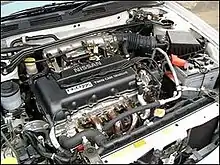
The 2.0 L (1,998 cc) SR20VE has Nissan's Neo VVL variable valve timing with lift control. It produces 190 PS (187 hp; 140 kW) at 7000 rpm and 20.0 kg⋅m (196 N⋅m; 145 lb⋅ft) at 6000 rpm with a 10.3:1 compression ratio and later (2001–2003) 204 PS (201 hp; 150 kW) at 7200 rpm and 21.0 kg⋅m (206 N⋅m; 152 lb⋅ft) at 5200 rpm with a 11:1 compression ratio.
It is used in the following vehicles:
- 1997-2000 P11 JDM Nissan Primera Te-V sedan or G-V wagon, 190 PS (187 hp; 140 kW)
- 2001-2003 P12 JDM Nissan Primera, 20V sedan or W20V Wagon, 204 PS (201 hp; 150 kW)
- 1997-2000 U14 JDM Nissan Bluebird SSS-Z sedan, 190 PS (187 hp; 140 kW)
- 1997-2000 Y11 JDM Nissan Wingroad ZV-S wagon, 190 PS (187 hp; 140 kW)
SR20VET
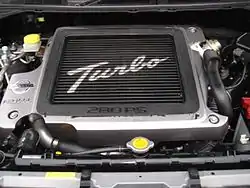
Available as original equipment only in the Japanese market, the 2.0 L (1,998 cc) SR20VET was the first turbocharged engine from Nissan with variable valve lift (VVL). It produces 320 PS (235 kW; 316 hp) at 6400 rpm and 309 N⋅m (228 lb⋅ft) at 3200 rpm, with 9.0:1 compression ratio.
It is used in the following vehicles:
- 2001-2007 PNT30 Nissan X-Trail GT
Camshaft Lift and Duration
| Manufacturer | Type | Duration [°] | Lift [mm] | Engine Notes | |
|---|---|---|---|---|---|
| Nissan | Intake | 232 | 8.66 | Stock low-port SR20DE (1985-2012) | |
| Nissan | Intake | 248 | 10.00 | Stock high-port SR20DE (1991-1993) | |
| Nissan | Exhaust | 240 | 9.2 | Stock Pulsar GTi-R (specific) SR20DET | |
| Nissan | Intake | 240 | 10.0 | Stock Pulsar GTi-R (specific) SR20DET | |
| Nissan | Exhaust | 248 | 10.0 | Stock Pulsar GTi-R (specific) SR20DET | |
| Nissan | Intake | 232 | 10.0 | Stock Roller Rocker SR20DE (2000-up) | |
| Nissan | Exhaust | 240 | 9.2 | Stock Roller Rocker SR20DE (2000-up) |
See also
References
External links
- SR20 Engine Buildup
- NeoVVL Owners Club The Resource for the NeoVVL Engine
- The SR20VE Motor Mini-Site